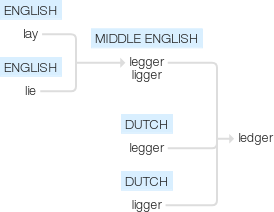Ledger
late Middle English legger, ligger (denoting a large bible or breviary), probably from variants of lay1 and lie1, influenced by Dutch legger and ligger . Current senses date from the 16th century, except the fishing senses, known from the 17th century.
wiktionary
From Middle English lygger, ligger, leger(“large breviary; beam, plank; dweller, inhabitant”), from leggen, liggen, leyen, [1] variants of līen(“to lie down; to bow, kneel, prostrate; to die; to be located (somewhere); to remain in place, stay”), from Old English liċġan(“to lie down; to be situated”), [2] ultimately from Proto-Indo-European *legʰ-(“to lie down”). The word is cognate with Dutch legger(“daybook; layer”) (from leggen(“to lay”), liggen(“to lie down”)), [3] and is related to English ledge, lie(“to be prostrate”).
The verb is derived from the noun. [4]
etymonline
ledger (n.)
c. 1400, " a book that lies permanently in some specified place" (especially a large copy of a breviary in a church), noun from leggen "to place, lay" (see lay (v.)). Perhaps formed on the model of a Dutch word; the -er seems to indicate "that which has been."
Commercial sense of "book of accounts" is first attested 1580s, short for ledger-book (1550s). Ledger (adj.) "remaining in a place, permanent, stationary" is attested from 1540s; compare ledger-bait "fishing bait made to stay in one place" (1650s).
The surname, however, is via the Normans, from St. Leger, a 7c. bishop whose memory was popular in France and Normandy. The name is Germanic, *Leodegar, literally "people-spear."
